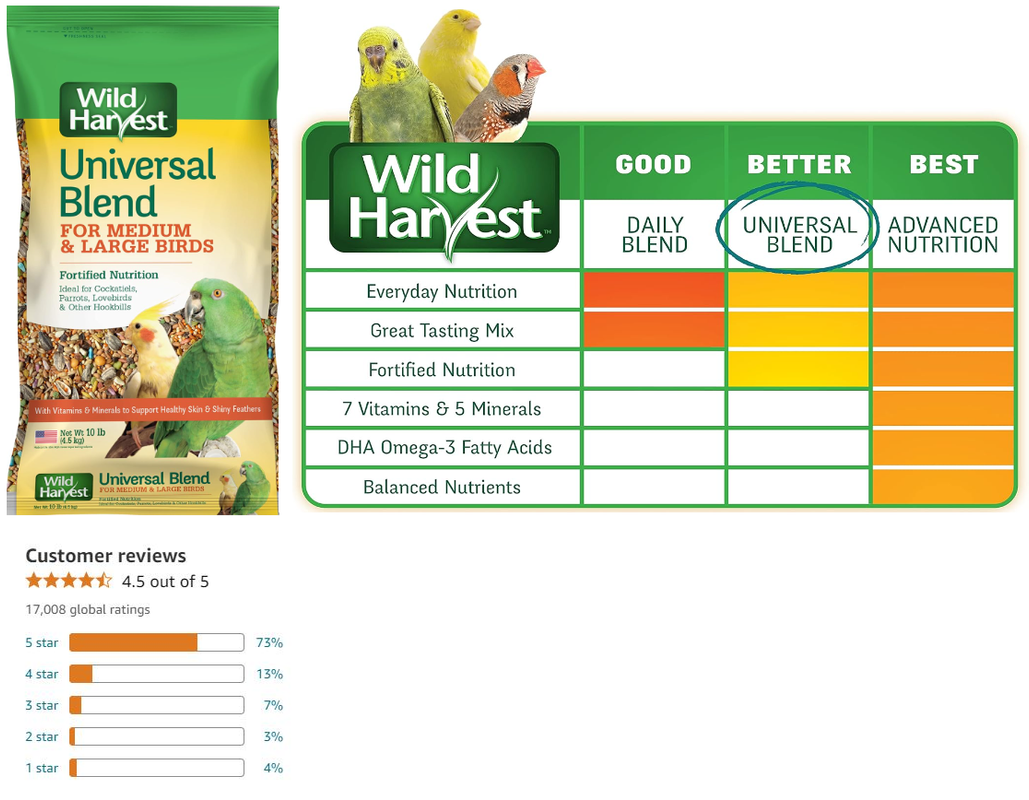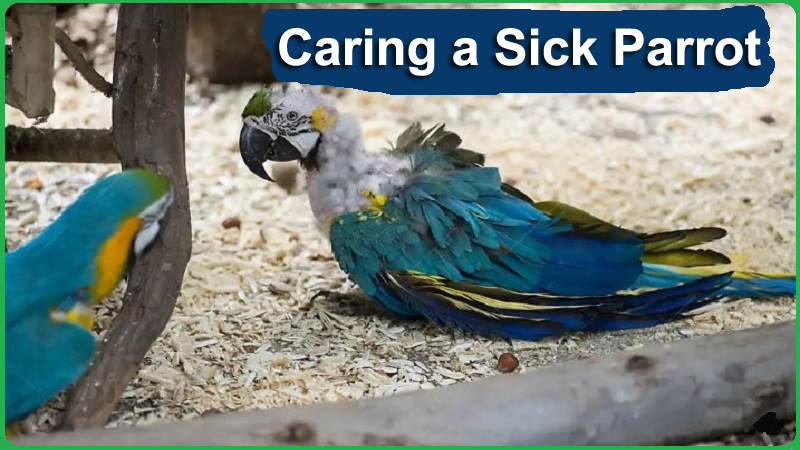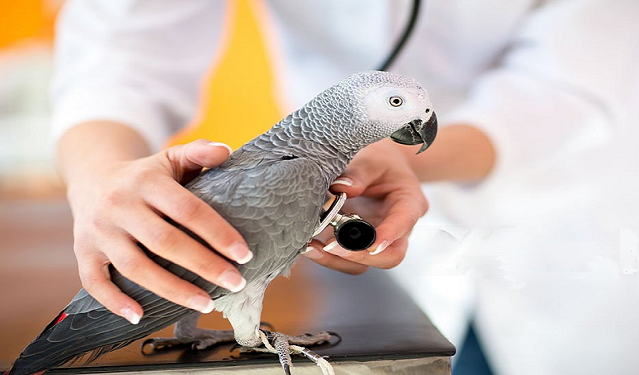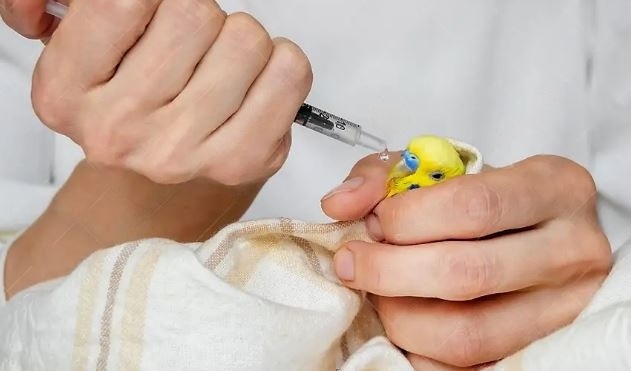To give protection the health of your beloved parrots, you have to need identifying the symptoms of illness in them as early as. As we know, if identifying any disease at an early stage, then it can be cured quickly. But, mostly people haven’t known about these factors and unable to reach that sick parrot. So, there are a few essential stuffs that helping you to recognize their health easily.
Today, we’re going to uncover some simplest and effective methods to tell if your parrot is sick. When you keep your eye on some common symptoms will significantly increase the possibility of a positive prognosis. As earlier you will identify illness in your pet parrot, the easier it will be treating.
So, if your parrot is showing the signs for illness, then quickly you have to visit the vet as soon as possible. Through this unique article, we will give you a comprehensive guide about how to treat your ill parrot, and on this duration how you can care for it.
What Are Causes of Parrot Illness?
Here are main causes of a sick parrot that helping to parrot owners take preventive measures and take timely treatment:
- Inadequate nutrition or imbalanced diet
- Dirty cages, contaminated food/water
- Due to drafts, smoke exposure, or pathogens
- Internal (e.g. worms) or external (e.g. mites)
- Avian influenza, polyomavirus

- Bacterial Infections like as Salmonella, chlamydia
- Fungal Infections (Aspergillosis from moldy environments)
- Ingestion of toxic plants, heavy metals (e.g. lead, zinc)
- Environmental changes, social stress, improper handling
- Falls, collisions, or attacks from other birds or pets.
How Do You Know If Your Parrot is Sick? {Signs & Symptoms}
Parrots have a more ability to hide the signs of illness. So, keep eye on attentive to subtle changes in your parrot’s behavior. Here, showing few key symptoms that help to indicate a parrot is sick:
Also Read: Is Your Parrot Coughing? Causes, Symptoms, and Treatment
Behavioral Changes
A sick parrot may be unusually sleepy, inactive, or reluctant to engage in normal activities such as playing, flying, or interacting with people and other birds.
A decrease in talking, singing or other vocalizations can indicate illness. Parrots that are normally noisy may become quiet and withdrawn.
Increased aggression, timidity, or altered interactions with other birds. A normally social parrot may become isolated or irritable.
If, parrot get feather plucking as excessive, then can indicate stress, boredom, or underlying health.
Physical Appearance
Parrots may fluff up their feathers to retain heat when they are unwell. This can make them appear puffier than usual.
Wings that hang lower than normal can indicate weakness or discomfort
Dull, discolored, or missing feathers, can be signs of illness.
Watery, cloudy, or colored discharge from the eyes or nostrils can indicate respiratory infections, or allergies.
Eating and Drinking Habits
A sick parrot may eat less that leading to rapid weight loss.
Abnormal droppings can also be a major symptom of sick. Changes may include unusual color (green, black, red), or the presence of undigested food.
Consuming water in large amount, it can be a sign of kidney problems, diabetes, or other metabolic disorders.
Respiratory Issues
Difficulty in taking breath that may open-mouth breathing, rapid or shallow breaths.
Frequent sneezing, coughing, or nasal congestion can indicate respiratory infections or irritations.
Clear, cloudy, or colored discharge from the nostrils can signal respiratory or sinus infections.
Neurological Symptoms
Shaking, convulsions, or uncoordinated movements can indicate neurological issues.
Loss of balance, frequent falls, or an inability to perch can be signs of neurological or musculoskeletal problems.
Head tilting or circling behaviors can indicate central nervous system issues or ear infections.
Proper Diagnosis and Treatment of Sick Parrot
Diagnosing and treating of a sick parrot include a systematic approach to recognize the underlying cause and give supportive medical care.
Also Read: Parrot Sneezing and its Causes, Symptoms, and Treatment
Diagnosis of Parrot Illness
Physical Examination: Assess the parrot’s overall health, including body condition, feathers, eyes, beak, and feet.
Behavioral Assessment: Evaluate behavior, activity level, and interactions to detect any changes indicative of illness.
Clinical Signs: Evaluate symptoms like lethargy, reduced appetite, respiratory distress, abnormal droppings, and neurological signs.
History Taking: Gather information on diet, environment, recent changes, and any previous health issues.
Diagnostic Tests: Conduct specific tests as needed, such as blood tests, fecal exams, crop swabs, and imaging (X-rays, ultrasound) to identify pathogens, nutritional deficiencies, or organ dysfunction.
Treatment of Parrot Illness
Medications: Administer antibiotics for bacterial infections, antifungals for fungal infections, antiparasitics for parasitic infestations, or antivirals for viral infections as prescribed by the vet.
Supportive Care: Provide fluids for dehydration, nutritional support for weak birds, and pain management if needed.
How to Treat a Sick Parrot at Home? Prevention Tips
Treating a sick parrot at home can be challenging task. While some minor issues can be managed with home care under veterinary guidance, but serious illnesses require professional treatment. Here are general guidelines about this:
Also Read: Can Parrots Get Cold? Parrots Safe Temperature
Consult a Vet: Seek professional diagnosis and treatment advice promptly.
Quarantine: Isolate the sick parrot to prevent spreading illness to other birds.
Clean Environment: Maintain a sanitized cage, clean perches, toys, and dishes regularly.
Optimal Conditions: Ensure stable temperature and humidity levels suitable for recovery.
Balanced Diet: Provide a varied diet of fresh fruits, vegetables, pellets, and controlled seeds. Offer fresh water and consider electrolyte solutions if recommended.
Monitor Carefully: Watch for changes in behavior, appetite, and droppings. Keep a record for vet updates.
Administer Medications: Follow vet instructions precisely for antibiotics, antifungals, or other prescribed treatments.
Provide Comfort: Offer a quiet, stress-free environment with comfortable perches and bedding.
Limit Stress: Minimize handling and noise to reduce stress levels.
Emergency Preparedness: Be ready to seek immediate veterinary care for severe symptoms or deterioration.
Medicine for Sick Parrot, But Consult by Your Vet
The type of medicine prescribed will depend on the specific illness diagnosed. Here are some common medications used in treating various parrot illnesses:
Antibiotics for Bacterial Infections
Parrots with bacterial infections like psittacosis (parrot fever) are typically treated with antibiotics such as:
- Tetracycline
- Doxycycline
- Azithromycin (for very young birds)
Treatment usually continues for 10-14 days after the fever resolves. Antibiotics do defence form the Chlamydia psittaci bacteria that causes psittacosis.
Antifungal Medications for Fungal Infections
Parrots with fungal infections like aspergillosis are treated with antifungal a medication that helps to fight the lung infection.
Antiparasitic Drugs for Parasites
Parrots infested with internal parasites like giardia or external parasites like mites are treated with antiparasitic medications.
Can Parrots Get Sick from Humans
The answer is ‘Yes’! Parrots can transmit illnesses from humans through various reasons.
Zoonotic diseases like avian influenza (bird flu) and psittacosis (parrot fever) can transfer between species.
Respiratory infections, such as common cold viruses, can be inadvertently transmitted through droplets in the air from humans to birds.
Stress from improper handling or excessive contact can weaken a parrot’s immune system, making them more susceptible to infections.
Must be regular veterinary check-ups helps to monitor and safeguard their health.
Can a Parrot Recover from Sickness?
Yes! Apply Proper supportive treatment and veterinary care; you can easily recover your sick parrot. It is most important to early detection and intervention for successful recovery.
Also Read: How to Tame a Parrot? Tips & Techniques for Success
Generally, treatment involves medication tailored to the specific illness, supportive care such as fluid therapy. As well as, you can also give nutritional support, and maintaining a clean and stress-free environment.
Parrots come in the category of resilient animals. So, many of them can fully recover from various health issues, such as bacterial and viral infections, parasitic infestations, and injuries.
Keep regular monitoring by a skilled avian veterinarian. They make ensuring about any changes in health are promptly addressed. It gets maximizing the chances of a complete recovery and long-term health.
FAQs (Frequently Asked Questions)
What Are Most Common Illnesses in Parrots?
There are some common illnesses like as respiratory infections, gastrointestinal issues, nutritional deficiencies, and parasites.
Can Parrots Transmit Diseases to Humans?
Yes, certain diseases like psittacosis (parrot fever) can be transmitted from parrots to humans.
What Should I Do if I Suspect My Parrot is Sick?
Seek immediate veterinary care for a proper diagnosis and treatment plan.
Is It Possible to Treat a Sick Parrot at Home?
Some minor illnesses can be easily managed at home under veterinary guidance. But, in serious conditions; you have to require a professional care.
What is Emergency Signs That My Parrot Needs Immediate Veterinary Attention?
Difficulty breathing, seizures, severe injuries, or sudden changes in behavior warrant urgent care.
Verdicts Up
In the world, every one either is animal or human being requires care and love. So, if you raising a parrot as a pet, then you have to show your full concern towards him.
Always keep a close eye on your sick parrot’s signs and check them carefully on a regular basis.
Do you have any experience, tips, tricks, or query regarding on this? You can drop a comment!
Have a Nice Day!!






